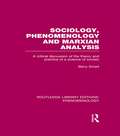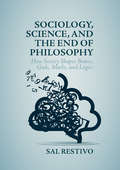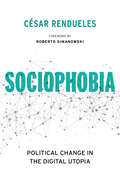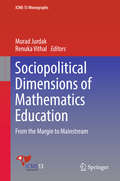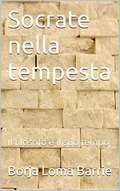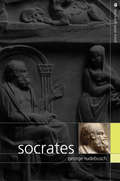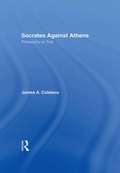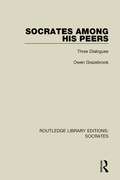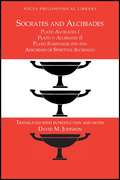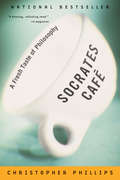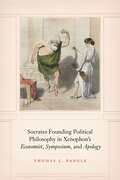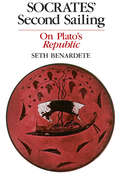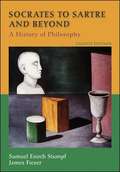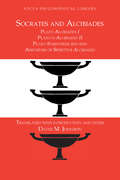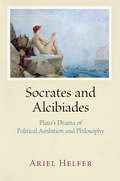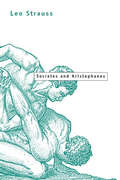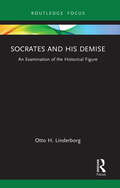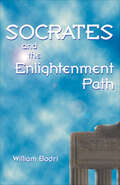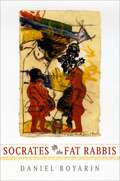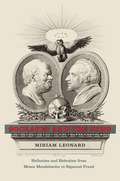- Table View
- List View
Sociology, Capitalism, Critique
by Hartmut Rosa Klaus Dörre Stephan Lessenich Jan-Peter Herrmann Loren BalhornThree radical perspectives on the critique of capitalismFor years, the critique of capitalism was lost from public discourse; the very word "capitalism" sounded like a throwback to another era. Nothing could be further from the truth today. In this new intellectual atmosphere, Sociology, Capitalism, Critique is a contribution to the renewal of critical sociology, founded on an empirically grounded diagnosis of society's ills. The authors, Germany's leading critical sociologists--Klaus Dörre, Stephan Lessenich, and Hartmut Rosa--share a conviction that ours is a pivotal period of renewal, in which the collective endeavour of academics can amount to an act of intellectual resistance, working to prevent any regressive development that might return us to neoliberal domination. The authors discuss key issues, such as questions of accumulation and expropriation; discipline and freedom; and the powerful new concepts of activation and acceleration. Their politically committed sociology, which takes the side of the losers in the current crisis, places society's future well-being at the centre of their research. Their collective approach to this project is a conscious effort to avoid co-optation in the institutional practices of the academy. These three differing but complementary perspectives serve as an insightful introduction to the contemporary themes of radical sociology in capitalism's post-crisis phase.From the Trade Paperback edition.
Sociology, Phenomenology and Marxian Analysis: A Critical Discussion of the Theory and Practice of a Science of Society (Routledge Library Editions: Phenomenology)
by Barry SmartSociology is an established academic discipline but there has been continuing debate over its status as a science and the nature of its subject matter. This led to the emergence of a phenomenological sociology and to critiques of positivist sociology. This critical reappraisal of the relevance of Marxian analysis for a science of society shows how these developments within sociology have had their counterpart in Marxism. The author analyses the status of Marx’s work and the Marxist ‘tradition’ in sociology. He focuses upon those concerns which are common to both Marxian analysis and sociology – the question of subjectivity; the nature of social reality; and the dialectical relationship of the ‘doing’ or practice of a science of society to the social world within which such social analyses are situated. Originally published in 1976.
Sociology, Science, and the End of Philosophy
by Sal RestivoThis book offers a unique analysis of how ideas about science and technology in the public and scientific imaginations (in particular about maths, logic, the gene, the brain, god, and robots) perpetuate the false reality that values and politics are separate from scientific knowledge and its applications. These ideas are reinforced by cultural myths about free will and individualism. Restivo makes a compelling case for a synchronistic approach in the study of these notoriously 'hard' cases, arguing that their significance reaches far beyond the realms of science and technology, and that their sociological and political ramifications are of paramount importance in our global society. This innovative work deals with perennial problems in the social sciences, philosophy, and the history of science and religion, and will be of special interest to professionals in these fields, as well as scholars of science and technology studies.
Sociophobia: Political Change in the Digital Utopia (Insurrections: Critical Studies in Religion, Politics, and Culture)
by César RenduelesThe great ideological cliché of our time, César Rendueles argues in Sociophobia, is the idea that communication technologies can support positive social dynamics and improve economic and political conditions. We would like to believe that the Internet has given us the tools to overcome modernity's practical dilemmas and bring us into closer relation, but recent events show how technology has in fact driven us farther apart.Named one of the ten best books of the year by Babelia El País, Sociophobia looks at the root causes of neoliberal utopia's modern collapse. It begins by questioning the cyber-fetishist dogma that lulls us into thinking our passive relationship with technology plays a positive role in resolving longstanding differences. Rendueles claims that the World Wide Web has produced a diminished rather than augmented social reality. In other words, it has lowered our expectations with respect to political interventions and personal relations. In an effort to correct this trend, Rendueles embarks on an ambitious reassessment of our antagonistic political traditions to prove that post-capitalism is not only a feasible, intimate, and friendly system to strive for but also essential for moving past consumerism and political malaise.
Sociopolitical Dimensions of Mathematics Education
by Murad Jurdak Renuka VithalThis book documents and expands on the diverse social and political dimensions of mathematics education issues, concerns, perspectives, contexts, and approaches presented in Topic Study Group 34 of the 13th International Congress on Mathematical Education (ICME-13). The book also argues for and promotes the mainstreaming of the sociopolitical dimensions of mathematics education through an ongoing critique and inquiry into content, policies, practices and theories. Accordingly, the main theme throughout the book is captured and illuminated by bringing voices from the margin to the mainstream. In this respect it is both aspirational and a reality, as evidenced by the increasing references to the sociopolitical dimensions in other areas of mathematics education—for example, in several of the plenary presentations at the ICME-13. The authors have reflected on their ideas with a view to orienting and enhancing research in the sociopolitical dimensions of mathematics education that is grounded in current education systems within their specific sociocultural contexts.
Socrate nella tempesta. Il filosofo e il suo tempo.
by Marcella Martelli Borja Loma BarrieRomanzo storico. Racconto biografico di Socrate, il filosofo maestro di Platone. La sua giovinezza e arruolamento nell'esercito. L'orrore della vita militare. I suoi inizi come un filosofo di Atene. La minaccia di Sparta e dei demagoghi Spartani. La sua abitudine nel domandare. L'odio degli ateniesi verso i filosofi. Il suo rapporto con il sofista Protagora. Il matrimonio male assortito con Santippe. Il suo arresto nella repressione ai filosofi. Il suo processo. Le accuse specifiche contro di lui. Le calunnie. La sorprendente decisione di morire.
Socrates
by George RudebuschSocrates presents a compelling case for some life-changing conclusions that follow from a close reading of Socrates' arguments. Offers a highly original study of Socrates and his thought, accessible to contemporary readersArgues that through studying Socrates we can learn practical wisdom to apply to our livesLovingly crafted with humour, thought-experiments and literary references (from the Iliad to Harry Potter), and with close reading sof key Socratic argumentsAids readers with diagrams to make clear complex arguments
Socrates
by Gregory VlastosThis long-awaited study of the most enigmatic figure of Greek philosophy reclaims Socrates' ground-breaking originality. Written by a leading historian of Greek thought, it argues for a Socrates who, though long overshadowed by his successors Plato and Aristotle, marked the true turning point in Greek philosophy, religion and ethics. The quest for the historical figure focuses on the Socrates of Plato's earlier dialogues, setting him in sharp contrast to that other Socrates of later dialogues, where he is used as a mouthpiece for Plato's often anti-Socratic doctrine. At the heart of the book is the paradoxical nature of Socratic thought. But the paradoxes are explained, not explained away. The book highlights the tensions in the Socratic search for the answer to the question 'How should we live?' Conceived as a divine mandate, the search is carried out through elenctic argument, and dominated by an uncompromising rationalism. The magnetic quality of Socrates' personality is allowed to emerge throughout the book. Clearly and forcefully written, philosophically sophisticated but entirely accessible to non-specialists, this book will be of major importance and interest to all those studying ancient philosophy and the history of Western thought.
Socrates Against Athens: Philosophy on Trial
by James A. ColaiacoAs an essential companion to Plato's Apology and Crito, Socrates Against Athens provides valuable historical and cultural context to our understanding of the trial.
Socrates Among His Peers: Three Dialogues (Routledge Library Editions: Socrates #1)
by Owen GrazebrookIn this book, first published in 1927, the author presents us with three conversations, fables, that, beautiful in themselves, also have a direct bearing on what is being discussed: Death and the Hereafter; Justice; and the Kingdom of Heaven.
Socrates And Alcibiades: Plato's Alcibiades I And Ii, Symposium (212c-223a), Aeschines' Alcibiades
by Plato David M. JohnsonSocrates and Alcibiades: Four Texts gathers together translations our four most important sources for the relationship between Socrates and the most controversial man of his day, the gifted and scandalous Alcibiades. In addition to Alcibiades' famous speech from Plato's Symposium, this text includes two dialogues, the Alcibiades I and Alcibiades II, attributed to Plato in antiquity but unjustly neglected today, and the complete fragments of the dialogue Alcibiades by Plato's contemporary, Aeschines of Sphettus. These works are essential reading for anyone interested in Socrates' improbable love affair with Athens' most desirable youth, his attempt to woo Alcibiades from his ultimately disastrous worldly ambitions to the philosophical life, and the reasons for Socrates' failure, which played a large role in his conviction by an Athenian court on charges of impiety and corrupting the youth. Focus Philosophical Library translations are close to and are non-interpretative of the original text, with the notes and a glossary intending to provide the reader with some sense of the terms and the concepts as they were understood by Plato's immediate audience.
Socrates Cafe: A Fresh Taste of Philosophy
by Christopher Phillips"A bracing, rollicking read about the spark that ignites when people start asking meaningful questions."--O Magazine Christopher Phillips is a man on a mission: to revive the love of questions that Socrates inspired long ago in ancient Athens. "Like a Johnny Appleseed with a master's degree, Phillips has gallivanted back and forth across America, to cafés and coffee shops, senior centers, assisted-living complexes, prisons, libraries, day-care centers, elementary and high schools, and churches, forming lasting communities of inquiry" (Utne Reader). Phillips not only presents the fundamentals of philosophical thought in this "charming, Philosophy for Dummies-type guide" (USA Today); he also recalls what led him to start his itinerant program and re-creates some of the most invigorating sessions, which come to reveal sometimes surprising, often profound reflections on the meaning of love, friendship, work, growing old, and others among Life's Big Questions. "How to Start Your Own Socrates Café" guide included.
Socrates Founding Political Philosophy in Xenophon's "Economist", "Symposium", and "Apology"
by Thomas L. PangleThe oeuvre of the Greek historian Xenophon, whose works stand with those of Plato as essential accounts of the teachings of Socrates, has seen a new surge of attention after decades in the shadows. And no one has done more in recent years to spearhead the revival than Thomas L. Pangle. Here, Pangle provides a sequel to his study of Xenophon’s longest account of Socrates, the Memorabilia, expanding the scope of inquiry through an incisive treatment of Xenophon’s shorter Socratic dialogues, the Economist, the Symposium, and the Apology of Socrates to the Jury. What Pangle reveals is that these three depictions of Socrates complement and, in fact, serve to complete the Memorabilia in meaningful ways. Unlike the Socrates of Plato, Xenophon’s Socrates is more complicated and human, an individual working out the problem of what it means to live well and virtuously. While the Memorabilia defends Socrates by stressing his likeness to conventionally respectable gentlemen, Xenophon’s remaining Socratic texts offer a more nuanced characterization by highlighting how Socrates also diverges from conventions of gentlemanliness in his virtues, behaviors, and peculiar views of quotidian life and governmental rule. One question threads through the three writings: Which way of life best promotes human existence, politics, and economics—that of the Socratic political philosopher with his philosophic virtues or that of the gentleman with his familial, civic, and moral virtues? In uncovering the nuances of Xenophon’s approach to the issue in the Economist, Symposium, and Apology, Pangle’s book cements the significance of these writings for the field and their value for shaping a fuller conception of just who Socrates was and what he taught.
Socrates Second Sailing: " On Plato's Republic
by Seth BenardeteIn this section-by-section commentary, Benardete argues that Plato's Republic is a holistic analysis of the beautiful, the good, and the just. This book provides a fresh interpretation of the Republic and a new understanding of philosophy as practiced by Plato and Socrates.
Socrates To Sartre And Beyond: A History Of Philosophy
by James Fieser Samuel Enoch StumpfThis comprehensive, historically organized introduction to philosophy communicates the richness of the discipline and provides the student with a working knowledge of the development of Western philosophy. With a lively and approachable style it covers the principal contributions of Western civilization's most influential philosophers. It provides ample detail without complicating minutiae. The text covers all periods of philosophy, lists philosophers alphabetically and chronologically on the end-papers, and features an exceptional glossary of key concepts.
Socrates To Sartre: A History Of Philosophy
by Samuel E. StumpfThis introduction for the beginning philosophy student has a historical approach and provides a working knowledge of the development of western philosophy. The text covers all periods, with four chapters on medieval philosophers and problems and includes women philosophers.
Socrates and Alcibiades: Plato's Alcibiades I & II, Symposium (212c-223a), Aeschines' Alcibiades
by David JohnsonSocrates and Alcibiades: Four Texts gathers together translations our four most important sources for the relationship between Socrates and the most controversial man of his day, the gifted and scandalous Alcibiades. In addition to Alcibiades’ famous speech from Plato’s Symposium, this text includes two dialogues, the Alcibiades I and Alcibiades II, attributed to Plato in antiquity but unjustly neglected today, and the complete fragments of the dialogue Alcibiades by Plato’s contemporary, Aeschines of Sphettus. These works are essential reading for anyone interested in Socrates’ improbable love affair with Athens’ most desirable youth, his attempt to woo Alcibiades from his ultimately disastrous worldly ambitions to the philosophical life, and the reasons for Socrates’ failure, which played a large role in his conviction by an Athenian court on charges of impiety and corrupting the youth.Focus Philosophical Library translations are close to and are non-interpretative of the original text, with the notes and a glossary intending to provide the reader with some sense of the terms and the concepts as they were understood by Plato’s immediate audience.
Socrates and Alcibiades: Plato's Drama of Political Ambition and Philosophy
by Ariel HelferIn the classical world, political ambition posed an intractable problem. Ancient Greek democracies fostered in their most promising youths a tension-ridden combination of the desire for personal glory and deep-seated public-spiritedness in hopes of producing brilliant and capable statesmen. But as much as active civic engagement was considered among the highest goods by the Greek citizenry, the attempt to harness the love of glory to the good of the city inevitably produced notoriously ambitious figures whose zeal for political power and prestige was so great that it outstripped their intention to win honor through praiseworthy deeds. No figure better exemplifies the risks and rewards of ancient political ambition than Alcibiades, an intelligent, charming, and attractive statesman who grew up during the Golden Age of Athens and went on to become an infamous demagogue and traitor to the city during the Peloponnesian War.In Socrates and Alcibiades, Ariel Helfer gathers Plato's three major presentations of Alcibiades: the Alcibiades, the Second Alcibiades, and the Symposium. Counter to conventional interpretation, Helfer reads these texts as presenting a coherent narrative, spanning nearly two decades, of the relationship between Socrates and his most notorious pupil. Helfer argues that Plato does not simply deny the allegation that Alcibiades was corrupted by his Socratic education; rather, Plato's treatment of Alcibiades raises far-ranging questions about the nature and corruptibility of political ambition itself. How, Helfer asks, is the civic-spirited side of political ambition related to its self-serving dimensions? How can education be expected to strengthen or weaken the devotion toward one's fellow citizens? And what might Socratic philosophy reveal about the place of political aspiration in a spiritually and intellectually balanced life? Socrates and Alcibiades recovers a valuable classical lesson on the nature of civic engagement and illuminates our own complex political situation as heirs to liberal democracy's distrust of political ambition.
Socrates and Aristophanes
by Leo StraussIn one of his last books, Socrates and Aristophanes, Leo Strauss's examines the confrontation between Socrates and Aristophanes in Aristophanes' comedies. Looking at eleven plays, Strauss shows that this confrontation is essentially one between poetry and philosophy, and that poetry emerges as an autonomous wisdom capable of rivaling philosophy. "Strauss gives us an impressive addition to his life's work--the recovery of the Great Tradition in political philosophy. The problem the book proposes centers formally upon Socrates. As is typical of Strauss, he raises profound issues with great courage. . . . [He addresses] a problem that has been inherent in Western life ever since [Socrates'] execution: the tension between reason and religion. . . . Thus, we come to Aristophanes, the great comic poet, and his attack on Socrates in the play The Clouds. . . [Strauss] translates it into the basic problem of the relation between poetry and philosophy, and resolves this by an analysis of the function of comedy in the life of the city. " --Stanley Parry, National Review
Socrates and Philosophy in the Dialogues of Plato
by Sandra PetersonIn Plato's Apology, Socrates says he spent his life examining and questioning people on how best to live, while avowing that he himself knows nothing important. Elsewhere, however, for example in Plato's Republic, Plato's Socrates presents radical and grandiose theses. In this book Sandra Peterson offers a new hypothesis which explains the puzzle of Socrates' two contrasting manners. She argues that the apparently confident doctrinal Socrates is in fact conducting the first step of an examination: by eliciting his interlocutors' reactions, his apparently doctrinal lectures reveal what his interlocutors believe is the best way to live. She tests her hypothesis by close reading of passages in the Theaetetus, Republic and Phaedo. Her provocative conclusion, that there is a single Socrates whose conception and practice of philosophy remain the same throughout the dialogues, will be of interest to a wide range of readers in ancient philosophy and classics.
Socrates and Self-Knowledge
by Christopher MooreIn this book, the first systematic study of Socrates's reflections on self-knowledge, Christopher Moore examines the ancient precept 'Know yourself' and, drawing on Plato, Aristophanes, Xenophon, and others, reconstructs and reassesses the arguments about self-examination, personal ideals, and moral maturity at the heart of the Socratic project. What has been thought to be a purely epistemological or metaphysical inquiry turns out to be deeply ethical, intellectual, and social. Knowing yourself is more than attending to your beliefs, discerning the structure of your soul, or recognizing your ignorance - it is constituting yourself as a self who can be guided by knowledge toward the good life. This is neither a wholly introspective nor a completely isolated pursuit: we know and constitute ourselves best through dialogue with friends and critics. This rich and original study will be of interest to researchers in the philosophy of Socrates, selfhood, and ancient thought.
Socrates and his Demise: An Examination of the Historical Figure (Routledge Focus on Classical Studies)
by Otto H. LinderborgThis book explores the circumstances surrounding Socrates’ death, critically analysing conflicting sources to establish a framework for understanding his intellectual activities in the cultural, political, and religious context of 5th-century BC Athens.What were the circumstances surrounding the death of Socrates? What do we know of his life and ideas? This book offers readers an understanding of the history and current landscape of Socratic studies while guiding them through the intricate historical context of Socrates’ life, death, and philosophy. By closely examining the reasons behind his trial and conviction for impiety in 399 BCE, we can develop a more thorough understanding of Socrates’ philosophy, as well as address the contradictions and fictional elements in his portrayals.Socrates and his Demise provides a fascinating re-assessment of Socrates and his death, of interest to students and scholars of Socrates and Socratic philosophy, as well as those working on the intellectual culture of 5th-century Athens and Classical Studies more broadly.
Socrates and the Enlightenment Path
by William BodriThis enlightening exploration of Buddhism and Socratic philosophy reveals the deep connections between these two profound traditions of thought.The basis of Western thought and, indeed, our educational system can be attributed to the truth-seeking methods of Socrates. One of the Greek philosopher’s most enduring concepts, the importance of self-knowing, has been echoed throughout Western literature and has many reverberations within Eastern thought.William Bodri shows that Socrates had attained a spiritual stage called samadhi, satisfying the requirements specified in Buddhist systems of one who had attained enlightenment. Bodri points to the comparisons and contrasts between East and West, illuminating both Buddhist and Socratic thought. Using Socrates as an example, Bodri calls for the broadening of our Western ideas of learning to encompass spiritual knowing.
Socrates and the Fat Rabbis
by Daniel BoyarinWhat kind of literature is the Talmud? To answer this question, Daniel Boyarin looks to an unlikely source: the dialogues of Plato. In these ancient texts he finds similarities, both in their combination of various genres and topics and in their dialogic structure. But Boyarin goes beyond these structural similarities, arguing also for a cultural relationship.In Socrates and the Fat Rabbis, Boyarin suggests that both the Platonic and the talmudic dialogues are not dialogic at all. Using Michael Bakhtin’s notion of represented dialogue and real dialogism, Boyarin demonstrates, through multiple close readings, that the give-and-take in these texts is actually much closer to a monologue in spirit. At the same time, he shows that there is a dialogism in both texts on a deeper structural level between a voice of philosophical or religious dead seriousness and a voice from within that mocks that very high solemnity at the same time. Boyarin ultimately singles out Menippean satire as the most important genre through which to understand both the Talmud and Plato, emphasizing their seriocomic peculiarity.An innovative advancement in rabbinic studies, as well as a bold and controversial new way of reading Plato, Socrates and the Fat Rabbis makes a major contribution to scholarship on thought and culture of the ancient Mediterranean.
Socrates and the Jews: Hellenism and Hebraism from Moses Mendelssohn to Sigmund Freud
by Miriam Leonard"What has Athens to do with Jerusalem?" Asked by the early Christian Tertullian, the question was vigorously debated in the nineteenth century. While classics dominated the intellectual life of Europe, Christianity still prevailed and conflicts raged between the religious and the secular. Taking on the question of how the glories of the classical world could be reconciled with the Bible, Socrates and the Jews explains how Judaism played a vital role in defining modern philhellenism. Exploring the tension between Hebraism and Hellenism, Miriam Leonard gracefully probes the philosophical tradition behind the development of classical philology and considers how the conflict became a preoccupation for the leading thinkers of modernity, including Matthew Arnold, Moses Mendelssohn, Kant, Marx, Nietzsche, and Freud. For each, she shows how the contrast between classical and biblical traditions is central to writings about rationalism, political subjectivity, and progress. Illustrating how the encounter between Athens and Jerusalem became a lightning rod for intellectual concerns, this book is a sophisticated addition to the history of ideas.

